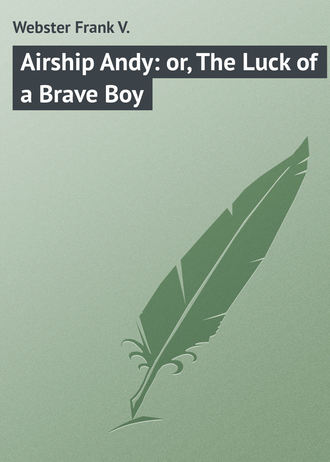 полная версия
полная версияAirship Andy: or, The Luck of a Brave Boy
The merry, happy coterie crossed the field, and coming out at a gate made a short cut for the Parks camp. They had just neared it, when among the crowd thronging about the place, Andy made out a boy edging towards him.
He crowded past several persons and came up to Andy’s side and caught his sleeve.
“Andy,” he said in a bold but sheepish way, “you know me, don’t you?”
“Why, yes, I know you,” answered Andy.
He stared in mingled surprise, perplexity and distrust at the speaker.
It was Dale Billings. Hungry-faced, unkempt looking, as if he had not slept for a week, and then in a hay mow or a freight car. Andy’s old-time enemy confronted him in the hour of his great triumph.
CHAPTER XXIV – A HOPEFUL CLEW
“Did you want to see me, Dale,” inquired Andy.
“Yes, I do, and bad,” responded Dale Billings. “See here, you’ve won a big race. You’re rich. If it hadn’t been for me and Gus Talbot, you wouldn’t be.”
“How is that?” inquired Andy.
“We figured along the line, didn’t we? If I’d gone to work for old Talbot when I had a chance, you’d have been out and wouldn’t have learned about automobiles and machinery and such, and couldn’t have run an airship and won the race.”
This was queer reasoning. Andy had to smile. He couldn’t feel any way but pleasant and happy with the great airship prize his, however, and he said:
“Well, let that go. What are you driving at, Dale?”
“We’re in hard luck, me and Gus.”
“You look it,” said Andy.
“We haven’t got a cent, we don’t dare to go back home. Gus is sick in an old shed down the tracks, and we haven’t had a mouthful to eat since yesterday morning. There’s no friends here we know but you. I’m just desperate. Loan me two dollars, Andy.”
“Why certainly,” answered Andy.
“I mean five – yes, if you’ll loan us ten dollars till we get work and on our feet, we’ll pay it back.”
“All right,” agreed Andy, “only you’ll have to come up to our camp for it. You know where it is – Parks’ camp.”
“Yes, I know.”
“I want to have a talk with you. You can depend on the money, Dale.”
A thought ran through the mind of the young aviator that by kindness he might make some impression on the two outcasts. As he summed up the meanness and audacity of his recent capture, however, Andy secretly confessed that it would be a hard undertaking.
First thing of all, our hero took a bath and got himself in better shape generally. Mr. Parks and a group of his friends occupied the main sitting room. Andy had left Dale in one of the smaller apartments of the old shack. As he went thither he passed Scipio, arrayed in white apron and natty cap and warbling a plantation ditty as he brandished knife and carver gaily.
“Getting sech a dinnah, Andy, chile,” he chuckled. “Ah give you a feast you nebber forgit.”
“Now then, Silas,” said Andy, entering the room where he had left the farmer boy, “I’ve got time to shake your hand good and hearty, and glad to do it.”
“And I’m glad you’re not too proud to do it,” replied Silas.
“You’ve done a big thing for me, Silas,” went on Andy.
“Think so?”
“Where would the race be if you had not come along in the nick of time and set me free?”
“I was mightily surprised to see you in that queer fix,” said Silas, “and I didn’t know what had happened when you started on a rush for the airship.”
“Well, you understand now,” said Andy. “Now then, Silas, what can I do for you?”
“Do, how?”
“I want to acknowledge your usefulness in some way. There must be something you want or need.”
“You mean you’d like to give me some little memento for trying to help you along?”
“That’s it.”
“But I’m glad to do it for nothing.”
“Never mind. Come, speak out, Silas. A bicycle, a nice new watch and chain?”
“Why, see here,” said Silas, after a moment’s deep thought, “if it’s the same to you, I’d like ten dollars and seventeen cents.”
Andy smiled. “For something special?” he inquired.
“Why, yes. You see I want to go to school this winter and learn shorthand. The term is eighteen dollars, and I’ve only saved up seven dollars and eighty-three cents.”
“I’ll do better than that for you, Silas,” said Andy, “and I’m glad to find you so ambitious. How is your father?”
“All right, I guess, though I haven’t seen him for nigh onto a month.”
“Why, how’s that?”
“I’ve been staying at the Collins farm.”
“You have?” exclaimed Andy, at once interested.
“Yes. Just came up from there yesterday. There hasn’t been much doing, and won’t be until the folks get their new house built. I was on their hands, though, and I’m staying around visiting relatives.”
“How do you mean you was on their hands, Silas?” inquired Andy.
“Why, dad got talking with Mr. Collins after we’d got rid of the geese. There’s a good academy at Wade, and Mr. Collins was going into sheep in a big way. He offered me quite a good job and the chance to go to school in the winter, and I took it.”
“But Mr. Collins’ house burned down,” said Andy.
“What, did you hear of that?” asked Silas in surprise.
“Yes,” nodded Andy.
“Well, that put things in bad shape for the family, but they are coming back soon, and in the meantime I tend to the sheep in the pasture lot. Lucky they had moved the old shed over there for storm shelter before the house and barns burned down.”
“What shed?” asked Andy, with a quick start.
“The one that stood under the old elm tree. Don’t you remember? Why, it was the shed you changed your clothes in.”
“What!” shouted Andy, jumping to his feet in intense excitement; “that shed wasn’t burned down?”
“Ain’t I telling you? They moved it over to the pasture on skids two weeks before the fire.”
“And it is there now?”
“Yes – but don’t!”
Andy felt like making a rush at once at the great hopeful news Silas had told. The latter had grabbed his arm.
“Don’t what?”
“Bolt. You’re going to make a dash like you did this morning.”
“No, Silas,” said Andy, trying to be calm. “You can’t imagine what great news you have brought me.”
“I don’t see how.”
“We must go to the Collins farm at once, Silas, that old shed had a shelf up over the side window?”
“Remember that, do you? So do I.”
“It had a lot of rubbish on it.”
“I noticed that.”
“Has it ever been disturbed?”
“Not that I know of. You see, Mr. Collins was arranging to have the old barracks patched up by a carpenter from Wade, when the fire came along.”
“Silas,” said Andy, “I threw my old clothes up on that shelf. If they are still there, I shall be able to find an old leather pocketbook in them that contains a paper upon which depends a fortune.”
“You don’t say so?” remarked Silas, in open-mouthed wonderment “What queer things you happen across!”
“A gentleman named Webb is very, very anxious to recover that pocketbook. I want you to go at once with me and see if the clothes are still there,” and Andy briefly recited the story of the lost pocketbook and the details of his recent visit to the Collins farm.
He was consulting a railroad timetable to determine when the next train left Montrose, when Scipio rushed into the room.
“Andy, boy,” he spoke quickly, “yo’ told a boy to told me dat he was to be let come to see yo’?”
“What kind of a boy, Scipio?” inquired Andy.
Scipio described Dale Billings, and as he did so passed some personal comments on his “’spicious” appearance.
“Yes, that’s right, Scipio,” said Andy.
“Den somefin’s wrong,” declared the perturbed cook. “When he come, I say Mistah Nelson very much preoccupied with another gemman, and he must wait. He sot down on dat chair just outside the door hyar.”
“Go on, Scipio.”
“I keep my eye on him. Dat boy,” announced Scipio, “remind me of mean, low-down people, I meet afore in my ’sperience. Bimeby I watch him bend towards de door. He seemed listening. Den I saw him start and draw closer to de door. Den all of a sudden he make a rush out of de place. I run to de gate. Den anoder sneaking-looking boy meet him. Dey talk fast, berry much excited. Den dey make a run towards the railroad tracks as if dey was in a turrible hurry.”
“Dale Billings and Gus Talbot!” exclaimed Andy, on fire with the intelligence imparted by his loyal, dusky friend. “Silas, they have got our secret. They are after the old leather pocketbook on the Collins farm. We must get there first!”
Andy directed Silas to wait where he was. Then he ran to the room where Mr. Parks was engaged with his friends. Appearing at the doorway he attracted the attention of the aeronaut and beckoned to him.
“What is it, Andy?” inquired Parks, coming outside. “You look excited.”
“I am,” admitted Andy, and then very briefly, but clearly, he explained his urgency.
“I say, you mustn’t let any grass grow under your feet!” exclaimed Parks. “I reckon you’ve got it right – that sneaking fellow you was trying to help is off on the track of the old shed you tell about. There’s the Racing Star– no, that won’t do, but – I’ve got it, Andy. Wait here a minute.”
John Parks flashed in among his friends and then flashed out again. Now he was accompanied by a well-dressed portly gentleman whom Andy had seen about the aviation grounds, and whom he knew to be one of the principals in getting up the race.
The aeronaut was busy talking fast and urgently to this person, who nodded to Andy and said:
“That’s all right Do you know how to run an automobile?” to Andy.
“Why, that was his old business,” explained Parks.
“I’ll risk anybody getting ahead of you, then. My machine is just outside the camp.”
“Come on, Silas,” hailed Andy as they passed on towards the gate.
Andy found a magnificent six-cylinder automobile just outside the camp. He thanked its owner heartily for allowing its use, beckoned Silas to the rear seat, and waved adieu to his employer with the cheery words:
“I’ll be back inside of two hours, Mr. Parks.”
“Say,” bolted out Silas, holding on with both hands as they crossed the railroad tracks and struck a winding country road due north, “isn’t – isn’t this going pretty fast?”
“Oh, this is just starting up,” declared Andy.
“I never rode in one of these before,” said Silas. “Those sneaks won’t get much ahead of this, I’m thinking.”
Andy thought this, too. There was not the least doubt in his mind that Dale Billings and Gus Talbot were already on the trail of the old leather pocketbook. All they could do, however, was to steal their way on some slow freight train. Still, they might induce someone to go for them or with them by faster travel. They might get an automobile, even if they had to steal one. Andy felt that it was pretty hopeless trying to make Dale or Gus respectable. He had intended, in the liberality of his heart, to put them on their feet. Here, the first thing, Dale was acting the part of a sneak and a thief.
It felt good to Andy to get back to his old business once more. Once out on a clear, level road, he made the machine fairly hum. Various ejaculations back of him told that his unexperienced passenger was having spasms. In considerably less than an hour the machine reached Wade. They were soon at the site of the Collins farmhouse.
“There’s the old shed, see?” spoke Silas, as Andy directed the machine across the fields.
“Yes, I see,” said Andy, “and it’s a sight for sore eyes.”
He halted the machine and jumped out as they reached the fence of a pasture lot containing several flocks of sheep. In one corner of it stood the old shed. Silas was worked up to quite as high a pitch of suspense and expectation as Andy himself.
“There’s the shelf!” he cried, as Andy passed through the doorway.
“Yes, but – my old clothes are not here.”
“Oh, don’t say that!” almost choked out Silas.
“It is true,” said Andy, getting down from the keg he was standing on. “Here’s a lot of old truck, wagon hardware and hoops and a grindstone, but the clothes are gone.”
Silas uttered a dismal groan.
“Oh, I’m a hoodoo!” he declared, banging his head first on one side and then on the other. “Here I’ve made you all this trouble, all for nothing. But, say,” added the farmer eagerly, “some one must have taken those clothes. We may trace them down. And say, some one has been in this shed since I left it yesterday.”
“Why do you think so?”
“Someone has slept here. See, the floor is covered with straw. Some tramp, I suppose. It rained last night, and he came in here for shelter. Oh, whoop! whoopee!”
At first Andy thought his companion had taken leave of his senses. With a Comanche-like yell Silas had made a spring. Then a method to his apparent madness was disclosed.
Andy saw him pull a wadded mass out of a hole formerly used to admit a stove pipe. Andy gasped with gladness and hope.
“My clothes,” he said, “sure enough!”
“Don’t you see?” said the jubilant Silas, dancing a joyful hornpipe. “It rained. The tramp who stayed here stuffed up the hole to shut out the rain. Say, sure your clothes?”
“Yes,” said Andy, searching them.
“And the pocketbook?”
“Here it is,” cried our hero in a strained tone that trembled. “Yes, the pocketbook is here all right.”
“Hurrah!” yelled Silas Pierce at the top of his voice.
CHAPTER XXV – GOOD-BY TO AIRSHIP ANDY
“A visitor for yo’, Marse Andy,” announced Scipio.
“It’s only me,” said Mr. Chase, stepping into the sitting room of the aerodrome at the Parks’ camp.
“Well, no one is more welcome, Mr. Chase,” declared Andy heartily. “Come in, sit down, and make yourself at home.”
“Not till I ask a certain question,” dissented the grizzled lockup-keeper of Princeville.
“Fire away,” smiled Andy. “What’s the question?”
“Can you get me a job?”
“Right off, and a good one,” responded Andy promptly. “My employer, Mr. Parks, is going into the airship line as a regular professional, and I don’t know a better all-round handy man I would recommend sooner than you.”
“All right,” said Chase, with a sigh of relief, dropping into a chair and placing a bulging, ancient carpet bag on the floor. “I’m done with lockups.”
“Is that so, Mr. Chase?”
“It is, and with that conscienceless old grafter, Talbot. You know I told you I was waiting for something when I last saw you.”
“Yes,” nodded Andy.
“It was Wandering Dick.”
“So you told me.”
“I sent that tramp after him. He found him. I got from Dick what I wanted, paid for it, resigned my position, and now I am here.”
“Quick work.”
“And here’s what I got from Wandering Dick.”
Chase extended to Andy a neatly folded paper.
“And what is this, Mr. Chase?” asked Andy.
“A confession and affidavit.”
“How does that interest me?”
“Read and see.”
Andy’s face grew interested and then startled as he perused the sheet of paper. It was a legal document attested to by Wandering Dick before a regular justice of the peace at Princeville.
In his affidavit the tramp stated that on the night that the barn of Farmer Jones burned down, he was in its hay mow. He saw distinctly the two boys who set the fire – Gus Talbot and Dale Billings. He got out of the way for fear of being charged with the crime, sought later shelter at the jail, and told Chase about it.
The latter was so dependent upon Talbot and in dread of the garage keeper, who held his position at his mercy, that he made no move to right Andy with the public until the latter was arrested.
“You have done nobly, Mr. Chase,” said Andy with deep gratitude, “and where is your bill of expenses to settle?”
“Settle nothing!” flared out Chase stormily. “You ever mention it again and I’ll get out of here bag and baggage, double quick.”
“Well, well,” answered Andy, “we’ll try to find some way to make it up to you.”
Two days later Andy learned that the attention of Seth Talbot had been called to the affidavit. Runaway Gus Talbot and Dale Billings had returned to Princeville. In some way the garage keeper settled with Farmer Jones, hushed up the matter, and sent his graceless son on a sea voyage. The charge against Andy was, of course, dismissed.
Andy went to visit Duske in the town hospital. His accomplice, Tyrrell, had been driven out of the aviation camp and threatened with a coat of tar and feathers if he ever returned. The rest of Duske’s party disappeared, and creditors seized what little property he had.
Duske would never drive a balloon or airship again. One arm and one foot were broken, and he had sustained other severe injuries. Andy found him a dispirited, wretched man.
He had an object in visiting the crippled aeronaut. He began by telling Duske that deeply as he tried to wrong Parks, the latter had ordered and paid for the best care during his stay in the hospital.
“I am circulating a subscription paper among the aviators,” added Andy. “We expect to raise a thousand dollars for you to go to some quiet town and buy some small business that will give you a living.”
No person could resist the kindliness of Andy under the circumstances. Duske broke down completely. He was as sincere and penitent as a man of his rough mould of mind could be.
“I don’t deserve it, I’ve been a bad man,” he declared, with tears in his eyes. “What can I do for you for all your kindness to me?”
“You can do something, Mr. Duske,” said Andy. “There is a man named Morse. Do you know him?”
“Why, yes, I do,” replied Duske, with a great start. “Do you?”
“I happen to.”
“What has he got to do with you and me?”
“Just this,” said Andy, “you have treated him badly. He is my friend. You had a hold on him. What was it?”
“A forgery he never committed.”
“Are you willing to prove that, and clear him?”
“Yes, indeed. I’ve done enough wickedness in the world.”
“Then clear his name of an unjust charge, so he can stand before the public the good, noble man he is.”
“I will,” declared Duske earnestly, and he did.
One week after the airship race Mr. Webb, to whom Andy had sent the old leather pocketbook by registered mail the day he recovered it, came down to the Parks camp.
“I have been too busy to come before,” he explained to Andy. “That document in the old leather pocketbook took up my time. I tell you, Nelson, it has brought brightness and comfort to two orphan children in a grand way.”
“I am very glad,” said Andy.
“I got back the two hundred dollars you left at the bank in Princeville,” continued Mr. Webb. “I have added something to it, and my attorneys have directed me to pay you what they intended to give the finder of the pocketbook – five hundred dollars.”
Andy made some demur at the largeness of the amount, but Mr. Webb was persistent, declared he was simply acting as agent for the lawyers, and Andy had to take the money.
“As to myself,” observed the gentleman, “I want to say what you must already know, Nelson – I am greatly interested in you. I wish you could suggest some way in which my means can benefit you.”
“So do I,” broke in John Parks. “The lad is a genius in the aviation line, and I want him to keep on at it.”
“Don’t I intend to?” challenged Andy.
“Not when you say you are going to leave me next month,” declared the aeronaut.
“Yes, but why?” said Andy. “I’ll leave it to Mr. Webb here if I have not decided in a sensible, practical way.”
“What is it, Nelson?” inquired Mr. Webb.
“Why, I have over two thousand five hundred dollars in the bank. I want to put one thousand of it aside for my half brother, when he turns up. He was good and kind to me in the old days, and I must not forget it. Then I want to go through college and learn something so I may be of some use in the world.”
“An excellent idea,” commended Mr. Webb.
“Yes,” growled Parks, but playfully, “and spoil a good aviator!”
“Not at all,” declared Andy quickly. “I love the airship business, Mr. Parks, but I want to learn every branch of the science that covers it. It looks as if airships are to be the coming vehicles of travel, you say, Mr. Parks. If that is so, everybody will be flying in time, and the professional aviator will be just a common, everyday person.”
“Well, I suppose that’s so,” admitted Parks.
“Then, the wise man will be the one who knows how to build the airship. Why, I’ll go through college, come out with my head chock full of new ideas, and Mr. Webb and you and I will get up the World’s Airship Construction Co.”
“That’s a pretty grand scheme, Nelson,” said Mr. Webb.
“Mayn’t it become a true one?”
“Yes, it may,” said John Parks, “but I’ll always think most of you just as you are – Airship Andy.”
THE END





